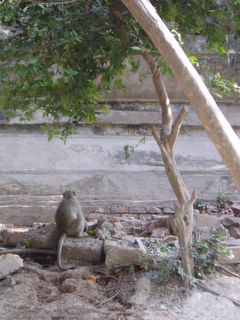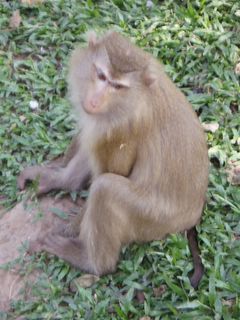Working from Ignorance
We had our first meeting to schedule work on the vegetable transport and packaging project today. The big tasks to be undertaken were seeking out and informally surveying farmers, wholesalers, distributors, and retailers regarding their involvement in the chain from harvest through to sale and hiring a team of field workers to collect data once the study is underway.
During the discussion on how best to collect data, I was politely silent and/or asking questions when I could. In response, others would keep seeking my opinion. My two responses, “I don’t know, what do you think would be best?” and “I think we wrote somewhere already that we would do this,” usually led to a short stretch of laughter, the kind the Khmer use to cover awkward moments, followed by a seemingly sensible decision being reached.
By the midway point of the meeting, I had a suspicion that there was a problem. I’m thoroughly ignorant of Cambodian culture, contacts, and agriculture in general. These people had years of experience in the field yet seemed earnestly interested in my opinion. Kimsan, the operations manager, is one of the most senior people at IDE. In Khmer culture, age commands both deference and respect. At 23, I was the youngest one there. Sunday, at about 30, never ventured a single opinion throughout the whole conversation. Certainly some of the atmosphere was due to the fact that I have a central role on this project. For the rest though, I think I may have just encountered the Khmer version of a development problem I’ve heard countless stories of before. As a Western foreigner, my opinion has far more value than it should.
By the time the conversation had moved onto hiring our team of field surveyors, I was totally adrift.
Colleagues: “We will find candidates through friends of our employees. Do we think we will need a CV from them? How much education will they need? What other skills? How much should we pay them?”
My thoughts: “Do I want to encourage nepotism? With only a week to hire the appropriate people and not knowing how hiring is done here, is there a viable alternative? Are CVs generally used for this type of contract hiring? What is education like here? What skills are needed to survey farmers and distributors, testing the quality of their crops as they are moved to market? What costs will they incur traveling about with the crops? What is a fair salary?”
Outside of some quick questions about procedures and past experience at IDE, I used my fallbacks as much as possible: “I don’t know. What do you think?”
Finally, Veasna, a Project Coordinator sitting across from me suggested that we should be sure to hire some women. Promoting gender equity! In a room full of men, at last a development buzzword of which I could be certain! “That sounds like a good idea,” says I. I had expressed an absolute opinion. Any of you with some previous EWB experience know what’s about happen…? ;)
Well, actually, as it turns out, there are difficulties. Will farmers be comfortable interacting with the women? Is it appropriate for an unwed young woman to stay overnight at someone else’s farm so as to take measurements in the evenings and mornings? If so, is it fair to discriminate and hire only married women? Are such even available for professional work that will keep them away in the field for a couple of weeks? Most day to day farming labour is performed by women. Will hiring women help us to gain an inside perspective?
I’ve had it instilled in me that the key to good development work is to be asking questions constantly, to seek information directly from those involved, to work with local resources, and to have as few preconceived assumptions as possible. I’m ignorant at this stage. I will be for a while yet. I know this and try to accept it, hoping that by trying to learn as much as possible, I can become more effective in the long run. In the short term though, working at an NGO is still work, requiring that I contribute. Finding the balance between working productively and reminding myself to take nothing for granted is going to be a big challenge.
On a lighter note, here are the pictures of monkeys that I promised.
I took these on my weekend visit to Wat Phnom, a temple on top of a 27m high hill, the only real hill in Phnom Penh as far as I know. The story of the city’s founding is that a woman named Penh found four statues of the Buddha lying in the river nearby. She housed them in a temple at this site and the city grew around it. The temple itself is crammed full of hundreds of statues. I have no idea which ones were the four in question.
Also, for those of you with blog clients, I’ve learned that you can point them to http://adamincambodia.blogspot.com/atom.xml, to keep you updated. This info courtesy of my friend James as I have a spotty idea at best of what a blog client is.



0 Comments:
Post a Comment
<< Home